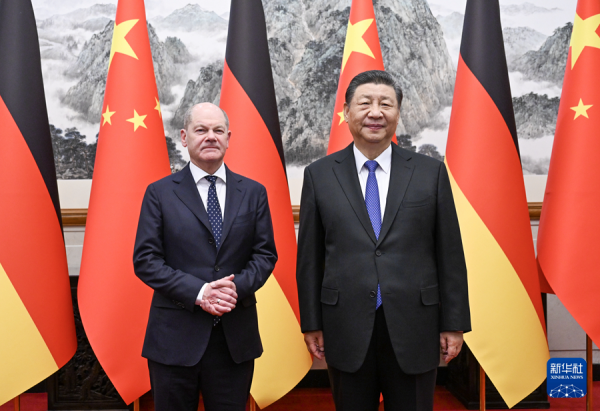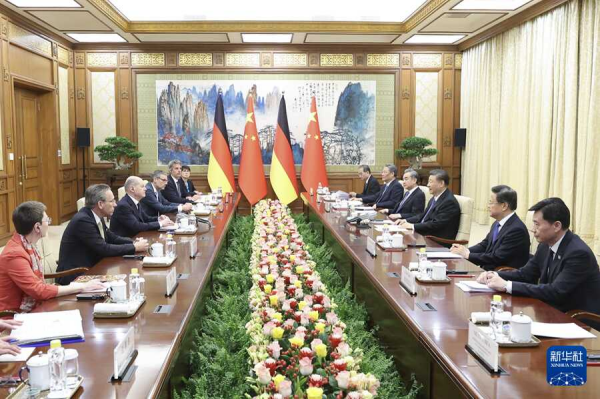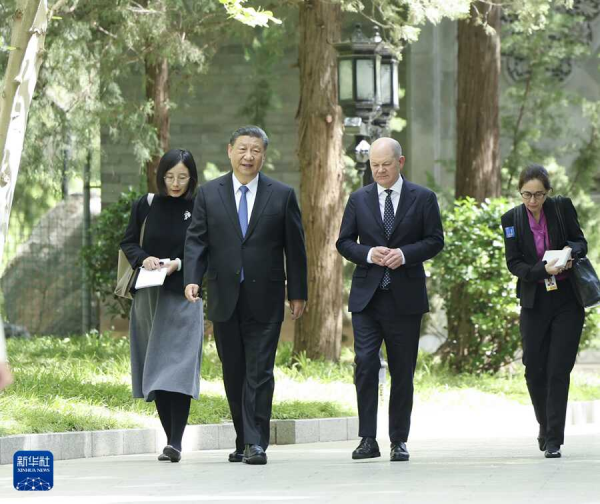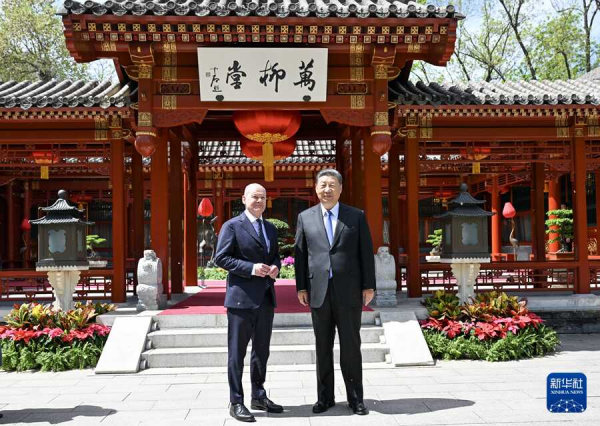
On the morning of April 16, President Xi Jinping met with German Chancellor Olaf Scholz at the Diaoyutai State Guesthouse in Beijing.
President Xi noted that this year marks the 10th anniversary of the establishment of the all-round strategic partnership between China and Germany. Over the past 10 years, despite tremendous changes in the international landscape, China-Germany relations have maintained steady growth, and bilateral cooperation has strengthened and deepened across the board, providing impetus for the development of both countries. Currently, transformation not seen in a century is accelerating across the globe, and humanity faces growing risks and challenges. These problems can only be resolved through major-country cooperation. As China and Germany are respectively the second and third largest economies in the world, the consolidation and development of their relations carries significance that goes beyond the bilateral scope, and has a major impact on the Eurasian continent and the entire world. The two countries need to view and develop bilateral relations from a long-term and strategic perspective, and work together to inject greater stability and certainty into the world.
President Xi underscored that both China and Germany have made major contribution to the progress of human civilization. The two countries do not have clashing fundamental interests between them and pose no security threat to each other. Cooperation between China and Germany benefits not just the two sides but also the world at large. The more instability in the world, the greater the need for the two sides to strengthen the resilience and vitality of their relations, keep to the overall direction of cooperation and development in growing bilateral ties, and stick to the characterization of all-round strategic partnership. China’s policy toward Germany is highly stable and consistent. The two sides need to continue engaging in close exchanges with an open mind and enhance strategic mutual trust. As long as the two sides uphold mutual respect, seek common ground while reserving differences, enhance exchanges and mutual learning, and pursue win-win cooperation, China-Germany relations will continue to enjoy solid and sustained progress.
President Xi noted that the industrial and supply chains of China and Germany are deeply intertwined, and that the markets of the two countries are highly interdependent. Mutually beneficial cooperation between China and Germany is not a “risk,” but the guarantee for a stable bilateral relationship and an opportunity for the future. There is huge potential to be tapped for pursuing win-win cooperation in both traditional sectors such as machinery and automobile, and new areas such as green transition, digitization and artificial intelligence. It is important for the two sides to promote the win-win features of their relations and enable each other to succeed. China’s export of electric vehicles, lithium batteries and photovoltaic products has not only enriched global supply and eased global inflationary pressure, but also made important contribution to the global response to climate change and the green and low-carbon transition. Both China and Germany are countries built on industries, and both support free trade and economic globalization. It is important for the two countries to stay vigilant against the rise of protectionism, adopt an objective and dialectical view on the issue of capacity through a market and global perspective and based on the laws of economics, and devote more efforts to the discussion on cooperation. China is committed to the basic national policy of opening up, and hopes that the German side can provide a fair, transparent, open and non-discriminatory business environment for Chinese enterprises in Germany. China and Germany share a lot in common on the issue of world multipolarity. A multipolar world is, in essence, one where countries with different civilizations, systems and paths respect each other and coexist in peace. China and Germany need to independently carry out collaboration on multilateral fronts, push the international community to take real actions to better address global challenges such as climate change, unbalanced development and regional conflicts, and make greater contribution to the balance and stability of the world.

Chancellor Scholz noted that Germany-China relations are now in good shape. The two countries have had close exchanges at all levels and in all fields. The two sides successfully held the intergovernmental consultation and high-level dialogues on strategic and financial issues, and will hold a dialogue on climate change and green transition. In the past two days, he visited Chongqing and Shanghai together with representatives of the German business community, and witnessed the great economic progress China made over recent years. He was particularly impressed by the close and sound cooperation between German and Chinese businesses. Going forward, the German side will work with the Chinese side to strengthen bilateral ties, deepen dialogue and cooperation in all fields, and promote people-to-people exchanges in such areas as education and culture, which is important for both countries and the world at large. The German side stands ready to enhance communication and coordination with the Chinese side to jointly tackle climate change and other global challenges. Both countries are committed to upholding the multilateral international order and promoting world peace and development, and they both disapprove of conflict and confrontation. The German side opposes protectionism and supports free trade. As an important member of the EU, Germany is ready to play a positive role in promoting the sound development of EU-China relations.
The two leaders also had an in-depth exchange of views on the Ukraine crisis, noting that both China and Germany stand committed to the purposes and principles of the U.N. Charter, oppose the use of nuclear weapons or attack on peaceful nuclear facilities, and call for efforts to properly address the issue of global food security and observe the international humanitarian law.
President Xi underscored that under the current circumstances, all parties should commit to an early restoration of peace to prevent the conflict from escalating and even spiraling out of control. To this end, a number of principles should be followed: first, focusing on the overall interest of peace and stability rather than seeking selfish gains; second, cooling down the situation rather than adding fuel to the fire; third, accumulating conditions for restoring peace rather than further aggravating tensions; and fourth, reducing the negative impact on the world economy rather than undermining the stability of global industrial and supply chains. China is not a party to the Ukraine crisis, but has consistently promoted talks for peace in its own way. China encourages and supports all efforts that are conducive to the peaceful resolution of the crisis, and supports the holding in due course of an international peace conference that is recognized by both Russia and Ukraine and ensures the equal participation of all parties and fair discussions on all peace plans. China will maintain close communication with all parties concerned, including Germany, on this matter.
The two sides also exchanged views on the Palestinian-Israeli conflict and other international and regional issues of mutual interest. The two sides shared the view that it is important to implement UNSC Resolution 2728, prevent escalation and further deterioration of the situation, ensure unhindered and sustained humanitarian access to Gaza, support the early settlement of the Palestinian question through negotiations on the basis of the two-State solution, and call on countries with influence to play a constructive role in maintaining regional peace and stability, with a view to achieving a comprehensive, just and lasting solution to the question of Palestine at an early date.

Following the meeting, President Xi and Chancellor Scholz took a walk and had lunch together, during which they further exchanged views on a wide range of issues.

Wang Yi was present at the meeting.

